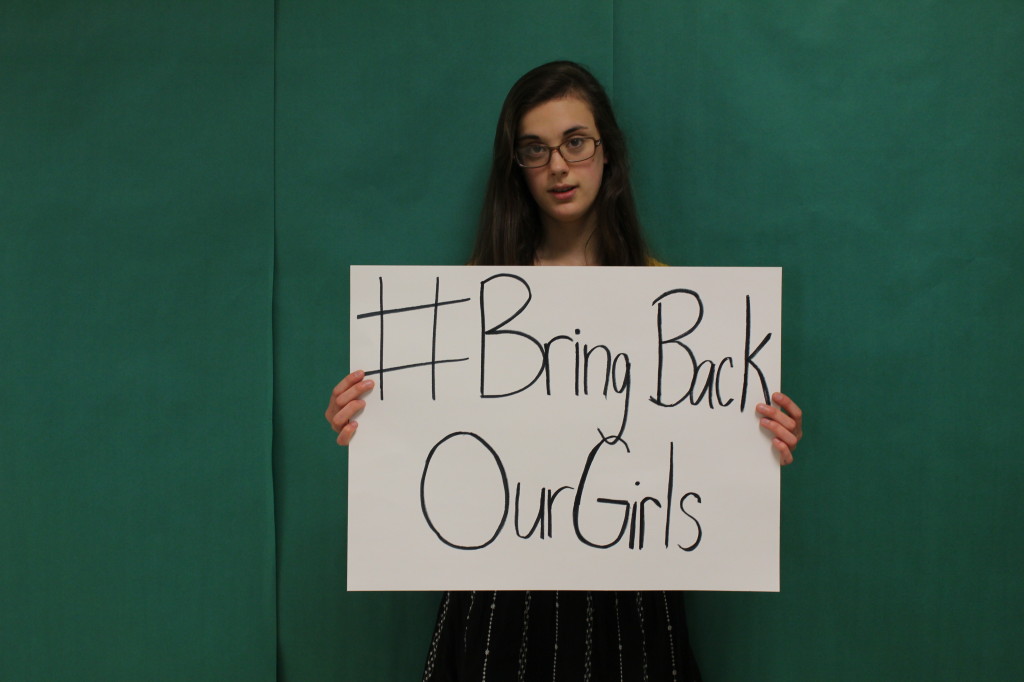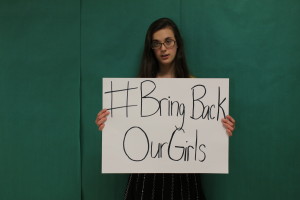#BringBackOurGirls: Addressing the kidnapping

Addressing the kidnapping of the 276 Nigerian girls and worldwide girls’ education
 On April 14, nearly 300 Nigerian girls were abducted from their boarding school by a terrorist group that denies the right of girls to attend school. The world has waited in horror as over three weeks has passed, yet little progress has been made in discovering the girls’ whereabouts. The numbers have varied over the weeks with different reports, but most recently, 276 girls have been reported missing.
On April 14, nearly 300 Nigerian girls were abducted from their boarding school by a terrorist group that denies the right of girls to attend school. The world has waited in horror as over three weeks has passed, yet little progress has been made in discovering the girls’ whereabouts. The numbers have varied over the weeks with different reports, but most recently, 276 girls have been reported missing.
The girls were kidnapped by the Islamist militant group Boko Haram, whose name literally means “Western education is a sin.” From the northern part of Nigeria, Boko Haram rejects all things Western and calls for a stricter enforcement of sharia – Islamic law. Boko Haram has bombed churches and mosques, kidnapped women and children, and assassinated politicians and religious leaders. The leader of Boko Haram is named Abubakar Shekhau; however, very little else is known about him. Recently, he posted a video taking credit for the kidnappings of the girls. He believes that God has called him to kidnap girls to prevent them from receiving an education. In a quote from CNN, he said, “I abducted your girls. There is a market for selling humans. Allah says I should sell. He commands me to sell.”
On the night of April 14, members of Boko Haram abducted the girls in their boarding school at gunpoint, shooting two armed guards, herding the girls into buses, vans, and trucks, and driving off. The girls were abducted from their boarding school in Chibok, Nigeria, about 600 miles from the capital of Abuja. Chibok is in the northern Borno area of Nigeria, where the government does not have firm grip. Airstrikes may not be a viable option because, due to the large number of hostages, captives could be killed.
The Nigerian military has not handled this crisis well, being both ill-equipped and less than trustworthy. The United States, Britain, and China, along with other nations have stepped in to solve this issue as soon as possible, but little progress has been made. The Nigerian government finally accepted U.S. offers of help last week, after three weeks of refusal. Because of the delay, chances of finding the girls are slim. However, United States President Obama has stated that the first priority is finding the girls; after that, Boko Haram must be dealt with.
Apparently, Boko Haram has been planning abductions of this kind since May 2013. According to Amnesty International, Nigerian security authorities were aware of Boko Haram’s impending raid on the boarding school four hours before it happened, but failed to take effective action.
The lack of education for women in Middle Eastern countries comes from religious and cultural ideals about the role of women; women are expected to stay at home and care for children, and to remain uneducated compared to their male counterparts. In addition, many Eastern groups oppose the influence of “Western teachings.” For years, girls’ education has been threatened in Middle Eastern countries, and the public outrage the the Nigerian kidnappings have garnered are bringing many other problems to light. In Pakistan, Malala Yousafzai was shot on a schoolbus by a Taliban gunman in 2009 for advocating for girls’ education on a blog through the BBC. In Afghanistan, there have 110 reported attacks on schools, including arson, explosions, and suicide bombings, between 2009 and 2012. Somalia and Mali have also been heavily targeted. The attacks on schools and discrimination against educated girls is largely tied to other conflict and extreme poverty in those areas. In Syria, most girls who had previously attended school had to drop out due to the worsening economic situation and the increase in violence. In April 2013, an estimated 2,445 of the country’s 22,000 schools had been destroyed, and nearly 2,000 were converted to shelters.
However, educating girls is one of the most powerful ways to improve an entire nation – literally. Statistics show when girls receive an education, they are less likely to have as many children, which reduces the youth bulge the world is currently experiencing. If there are fewer children, they will be better cared for, and living conditions will improve. Also, when are educated, they will be able to join the workforce, boosting the economy, raising living standards, and promoting a more virtuous cycle of development.
The US is considering several ways to track down the Nigerian girls, including military personnel, development experts, law enforcement, intelligence agents, and even the possibility of drones. (Drones, or unmanned aerial vehicles, would reveal more areas that humans would not be able to see otherwise).
In grave situations like this, it is important to remember that Boko Haram is an extremist group, and therefore not representative of Muslims or Nigerians. Instead, we must attempt to understand their views, as inhumane as they are, in order to negotiate possible solutions to the problem. It is also important to remember the gravity of this situation, no matter how removed from our personal lives it seems. On several websites, some people have commented that if nearly 300 American or European girls were abducted, the Western world would have reacted much more strongly than we have. The distance and poor communication does make it difficult to stay informed on the issue, but we must do our best to, if nothing else, understand what is happening, and engage in dialogue to explore possible solutions to the situation.
On twitter, the hashtag #BringBackOurGirls has been tweeted and retweeted over 800,00 times, including by celebrities and political figures. Hillary Clinton tweeted, “Access to education is a basic right & an unconscionable reason to target innocent girls. We must stand up to terrorism. #BringBackOurGirls.” U.S. Secretary of State John Kerry hosted a Twitter chat about Africa and answered many people’s questions about the kidnappings in Nigeria, showing his support to bring the girls home.
 Many celebrities also took a picture of them holding a sign with this phrase on it to show their support of the kidnapped girls and the movement to find them. Tiger Hi-Line Editor Ellen Wallingford did the same. Visit the hashtag #BringBackOurGirls on Twitter to learn how you can get involved in the conversation.
Many celebrities also took a picture of them holding a sign with this phrase on it to show their support of the kidnapped girls and the movement to find them. Tiger Hi-Line Editor Ellen Wallingford did the same. Visit the hashtag #BringBackOurGirls on Twitter to learn how you can get involved in the conversation.









You must be logged in to post a comment Login